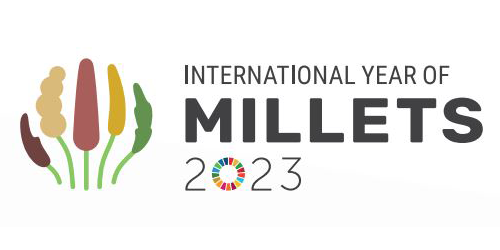2023: International Year of Millets

The United Nations designated the year 2023 as the International Year of Millets (IYM2023), raising awareness about the nutritional benefits, climate resilience, and cultural significance of millets.
The UN General Assembly, at its 75th session in March 2021, accepted a proposal by India and backed by more than 70 countries, to declare 2023 as the International Year of Millets. India celebrated 2018 as the National Year of Millets for encouraging cultivation and consumption of these nutri-cereals.
Throughout the year (2023), various events, campaigns, and initiatives were organized globally to highlight the importance of millets in food security, sustainable agriculture, and nutrition. These efforts aimed to encourage policymakers, farmers, consumers, and other stakeholders to promote the cultivation, consumption, and value addition of millets as part of efforts to achieve food security, mitigate climate change, and improve nutrition.
The designation of the International Year of Millets underscored the growing recognition of millets as a valuable crop with the potential to contribute to global food security, sustainable agriculture, and nutrition, particularly in the face of climate change and other challenges facing the agriculture sector. The year-long celebration formally concluded in March 2024.
Government of India’s Millets Push
In the Union Budget for 2022-23, the Government announced full support for post-harvest value addition, enhancing domestic consumption, and for branding millet products nationally and internationally. In order to make India a global hub for ‘Shree Anna’ (Millets), the Government in the Union Budget for 2023-24 announced that the Indian Institute of Millet Research, Hyderabad will be supported as the Centre of Excellence for sharing best practices, research and technologies at the international level. An Export Promotion Forum (EPF) dedicated to promoting millets in the international market has been established.
GoI’s 7 Sutras or Themes on Millets Promotion
- Enhancement of Production and Productivity: Strengthening quality seed chain; Technology demonstrations; Demand creation; Crop Diversification focus in favour of millets; Increased Procurement and Distribution
- Value Addition, Processing and Recipe Development: Strengthening of 3 Centres of Excellence with advanced infrastructure; Development of primary processing clusters at Farm Gate etc.
- Nutrition and Health Benefits: Digital compilation of research papers, Commissioning studies by international reputed organizations
- International Outreach: Global promotion as per FAO Action Plan; Involvement of Indian diaspora, embassies, famous cuisine shows, International food influencers & airlines
- Entrepreneurship, Startup and Collective Development
- Awareness creation – Branding, Labelling & Promotion
- Policy Interventions for mainstreaming
‘Millets’ were among the first crops to be domesticated in India with several evidence of its’ consumption during the Indus valley civilization. Being grown in more than 130 countries at present, Millets are considered traditional food for more than half a billion people across Asia and Africa.
In India, millets are primarily a kharif crop, requiring less water and agricultural inputs than other similar staples. Millets are important by the virtue of its mammoth potential to generate livelihood, increase farmers’ income and ensure food & nutritional security all over the world.
Jowar and Proso Millets (Common Millet) are the most cultivated millets in the 112 and 35 countries respectively. Sorghum and pearl millets covers more than 90% area and production. Remaining production comes from Ragi (Finger Millets), Cheena (Proso Millets), Foxtail Millets (Kangni) and other non-segregated millets.
India is the major producer of Millets in which Kangni, Kutki or small millet, Kodon, Gangora or Barnyard, china and Brown top are included with Jowar, Bajra, Ragi and small millets. India is poised to become the global hub for millets with a production of more than 170 lakh tonnes which makes for more than 80% of the millets produced in Asia.
Millets provide an alternative food system in times of increasing demand for vegetarian foods. Millets contribute to a balanced diet as well as a safe environment. These are the gifts of nature to mankind.
References:
- Closing ceremony of the International Year of Millets 2023 took place at the FAO headquarters, Rome, Italy in a hybrid set up, Ministry of Agriculture & Farmers Welfare, https://pib.gov.in/PressReleasePage.aspx?PRID=2016693
- https://apeda.gov.in/milletportal/
- https://www.fao.org/3/cc3253en/cc3253en.pdf
- https://nutricereals.dac.gov.in/
